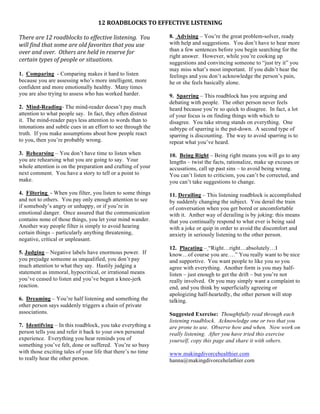
12 ROADBLOCKS TO EFFECTIVE LISTENING
- 1. 12 ROADBLOCKS TO EFFECTIVE LISTENING There are 12 roadblocks to effective listening. You will find that some are old favorites that you use over and over. Others are held in reserve for certain types of people or situations. 1. Comparing - Comparing makes it hard to listen because you are assessing who’s more intelligent, more confident and more emotionally healthy. Many times you are also trying to assess who has worked harder. 2. Mind-Reading- The mind-reader doesn’t pay much attention to what people say. In fact, they often distrust it. The mind-reader pays less attention to words than to intonations and subtle cues in an effort to see through the truth. If you make assumptions about how people react to you, then you’re probably wrong. 3. Rehearsing – You don’t have time to listen when you are rehearsing what you are going to say. Your whole attention is on the preparation and crafting of your next comment. You have a story to tell or a point to make. 4. Filtering - When you filter, you listen to some things and not to others. You pay only enough attention to see if somebody’s angry or unhappy, or if you’re in emotional danger. Once assured that the communication contains none of those things, you let your mind wander. Another way people filter is simply to avoid hearing certain things – particularly anything threatening, negative, critical or unpleasant. 5. Judging – Negative labels have enormous power. If you prejudge someone as unqualified, you don’t pay much attention to what they say. Hastily judging a statement as immoral, hypocritical, or irrational means you’ve ceased to listen and you’ve begun a knee-jerk reaction. 6. Dreaming – You’re half listening and something the other person says suddenly triggers a chain of private associations. 7. Identifying – In this roadblock, you take everything a person tells you and refer it back to your own personal experience. Everything you hear reminds you of something you’ve felt, done or suffered. You’re so busy with those exciting tales of your life that there’s no time to really hear the other person. 8. Advising – You’re the great problem-solver, ready with help and suggestions. You don’t have to hear more than a few sentences before you begin searching for the right answer. However, while you’re cooking up suggestions and convincing someone to “just try it” you may miss what’s most important. If you didn’t hear the feelings and you don’t acknowledge the person’s pain, he or she feels basically alone. 9. Sparring – This roadblock has you arguing and debating with people. The other person never feels heard because you’re so quick to disagree. In fact, a lot of your focus is on finding things with which to disagree. You take strong stands on everything. One subtype of sparring is the put-down. A second type of sparring is discounting. The way to avoid sparring is to repeat what you’ve heard. 10. Being Right – Being right means you will go to any lengths – twist the facts, rationalize, make up excuses or accusations, call up past sins – to avoid being wrong. You can’t listen to criticism, you can’t be corrected, and you can’t take suggestions to change. 11. Derailing – This listening roadblock is accomplished by suddenly changing the subject. You derail the train of conversation when you get bored or uncomfortable with it. Anther way of derailing is by joking: this means that you continually respond to what ever is being said with a joke or quip in order to avoid the discomfort and anxiety in seriously listening to the other person. 12. Placating – “Right…right…absolutely…I know…of course you are….” You really want to be nice and supportive. You want people to like you so you agree with everything. Another form is you may half- listen – just enough to get the drift – but you’re not really involved. Or you may simply want a complaint to end, and you think by superficially agreeing or apologizing half-heartedly, the other person will stop talking. Suggested Exercise: Thoughtfully read through each listening roadblock. Acknowledge one or two that you are prone to use. Observe how and when. Now work on really listening. After you have tried this exercise yourself, copy this page and share it with others. www.makingdivorcehealthier.com hanna@makingdivorcehelathier.com